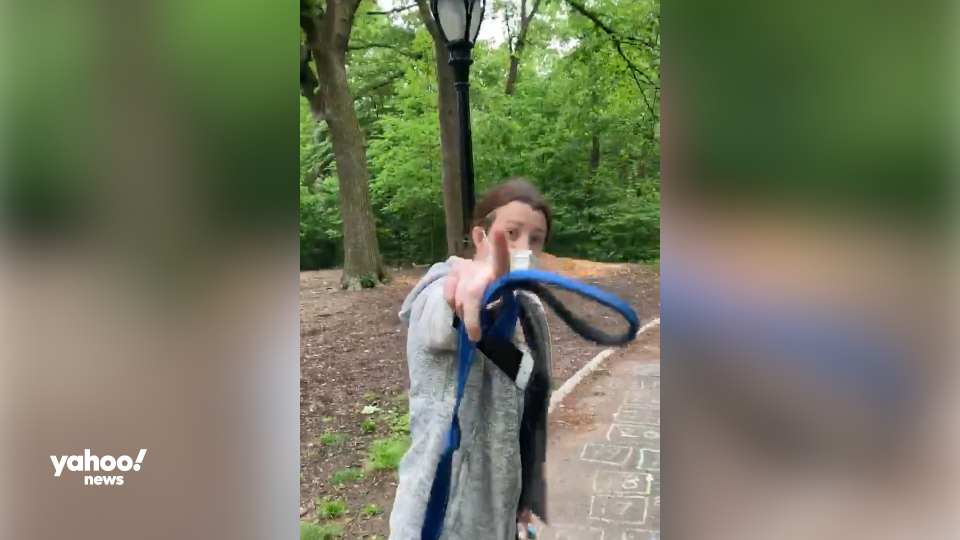Longtime public defender on Central Park video: 'The cops are inclined to believe a white accuser and the other person gets arrested.'
This week’s Central Park dog leash incident involving a white woman’s frantic police call falsely accusing a black man of threatening her is now under investigation, but longtime Manhattan public defender Eliza Orlins says these sort of “hysterical 911 calls” need to stop because lives are being ruined.
“I think this woman has been saying, ‘Oh, my life's been ruined ever since this tweet went viral,’” Orlins told Yahoo News. “But routinely, on a daily basis, people of color have their lives ruined by just an arrest, just an accusation.”
On Monday, Orlins composed a series of tweets detailing her time representing some of the city’s poorest individuals, and how she’s seen these kinds of situations unfold.
“I have tried cases where the Manhattan DA uses a ‘hysterical 911 call’ as categorical evidence of guilt,” she tweeted. “Usually there’s no video like this to refute it.”
She continued, “People are sitting on Rikers Island on the basis of nothing more than an accusation (like in this video!) with the added risk of contracting COVID-19.”
In the video that has since gone viral on Facebook and Twitter, Amy Cooper was walking her dog without a leash in the Ramble, a wooded part of Central Park that attracts more than 200 bird species, while Christian Cooper (not related) was bird-watching.
In the video, Amy Cooper tells the police that a man, later identified as Christian Cooper, is threatening her and her dog. “There's a man, African-American, he has a bicycle helmet,” she says. “He is recording me and threatening me and my dog.”

By the time police arrived, both had already left the area and no one was arrested. Amy Cooper has since been fired from her job and been targeted by widespread backlash online, while Christian Cooper has been lauded for keeping his composure. Still, the video has called into question the troubling use of 911 calls by people in non-emergency situations.
New York City's Commission on Human Rights launched a probe Wednesday into the incident, caught on video, in which a white woman calling the police on a black man after he asked the woman to leash her dog, as required, in that part of the park.
“At a time when the devastating impacts of racism in black communities have been made so painfully clear — from racial disparities in COVID-19 outcomes, to harassment of essential workers on the frontlines — it is appalling to see these types of ugly threats directed at one New Yorker by another," said Sapna Raj, deputy commissioner of the Law Enforcement Bureau at the New York City Commission on Human Rights. “Efforts to intimidate black people by threatening to call law enforcement draw on a long, violent and painful history, and they are unacceptable.”
The commission sent Amy Cooper a letter requesting her cooperation.
The Central Park dog dispute is not the first time calls like these have made national headlines. In April 2018, a white woman called the police on a black family for using a charcoal grill instead of a non-charcoal grill in Oakland, Calif. That same month, a white woman in Philadelphia called the police on two black men for sitting inside a Starbucks. On Tuesday, a white man in Minneapolis called the police on a group of young black men who were using a private gym and questioned whether the men “belong” there, despite the men being business owners within the building and having keycard access to the gym.

Each of these incidents were recorded and many more ended without physical harm to anyone involved. But not every confrontation is caught on camera.
One of the most infamous cases that turned violent took place in Money, Miss., in 1955. Carolyn Bryant, a white woman, accused a 14-year-old black boy named Emmett Till of following her into a store, grabbing her waist and bragging that he had been with white women before. That evening, the woman’s husband and brother-in-law murdered Till and threw his body into the Tallahatchie River.
The men were eventually prosecuted but found not guilty by an all-white jury. They later confessed to their crimes, but couldn’t be charged again.
More than 50 years later, Bryant confessed that she lied about the incident and didn’t know exactly what happened.
Even decades later, the cycle, as Orlins described, is a vicious and unforgiving one. “The cops are inclined to believe a white accuser and the other person gets arrested,” she said. “They get brought to court, they get charged by the Manhattan district attorney’s office. Based on these allegations, they get arraigned. Oftentimes, an outrageous bail gets set that their families are unable to afford to make. And then they sit at Rikers Island for days, weeks, months, even years.”

Orlins, who is running for Manhattan district attorney, said that she was inclined to put the series of tweets together because people all too often think incidents like the one that happened Monday are isolated.
“I think people really can say, ‘Oh, this video is so horrible,’ but not connect it with the broader systemic problems that we have, which are that a hysterical 911 call was a fabricated accusation can be used to really ruin someone’s life,” she said. “Thankfully, Mr. Cooper was recording and this video has gotten a lot of attention and brought this issue to light in a really meaningful way.”
_____
Click here for the latest coronavirus news and updates. According to experts, people over 60 and those who are immunocompromised continue to be the most at risk. If you have questions, please refer to the CDC’s and WHO’s resource guides.
Read more from Yahoo News:



